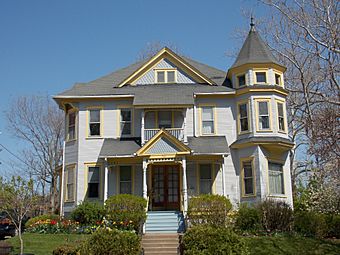McBride–Hickey House facts for kids
Quick facts for kids |
|
|
McBride–Hickey House
|
|
 |
|
| Location | 701 Iowa St. Davenport, Iowa |
|---|---|
| Area | less than one acre |
| Built | 1890 |
| Architectural style | Late Victorian Late 19th and 20th Century Revivals |
| MPS | Davenport MRA |
| NRHP reference No. | 83002467 |
| Added to NRHP | July 7, 1983 |
The McBride–Hickey House is a historic building located in Davenport, Iowa. This special house was added to the National Register of Historic Places in 1983, recognizing its importance in history.
House History
This beautiful house was built in 1890 for Patrick and Agatha McBride. Patrick, who came from Ireland, ran a grocery store in Davenport starting in 1865.
After Patrick passed away, Agatha sold the house in 1902 to Dennis J. Hickey, Sr. Dennis Hickey's two sons, Dennis Jr. and William, also lived in the house. They owned a successful company called Hickey Brothers. William was the president and treasurer, and Dennis Jr. was the vice-president and secretary.
Their company started small in 1901 with just one store. By 1905, they had several stores in the area. Before World War II, their business grew a lot, reaching 46 stores across the United States. By 1941, they had 55 retail shops, often located in hotels and small stores. Just eight years later, they had expanded to 120 stores in the United States and Cuba. Even with all this growth, the company's main office stayed right in Davenport.
House Style and Design
The McBride–Hickey House shows how building styles changed in Davenport around the year 1900. The main part of the house looks balanced and even, with five sections on its front. The way the middle section, porch, and roof window are placed makes it look very symmetrical. This style reminds people of Georgian Revival architecture.
However, the house also has parts that are not symmetrical, which is common in Victorian architecture. You can see this in the angled sections and a tall, three-story corner tower. The porch has details from the Eastlake Movement style, and the shingled roof window adds more interesting touches. These details make the house unique, even though its main front looks like a Colonial Revival style.



